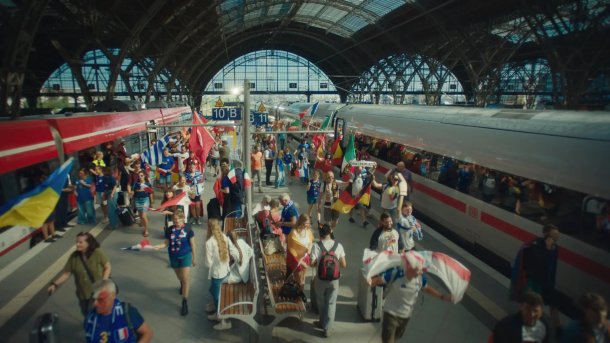Rail transport during EURO 2024: infrastructure at its limit
Canceled, delayed trains, overcrowded platforms [--] the railroads did not present a good picture during the European Football Championships.

This is how Deutsche Bahn illustrated Euro 2024 from its expectations at the end of May. It did not come very close to reality.
(Image: Deutsche Bahn AG / Tony Peterson Film)
Normally, the soccer magazine Kicker pays little attention to rail traffic. This changed during the current European Men's Championship. This week, for example, the Dutch team was unable to take the ICE train from Wolfsburg to the final press conference in Dortmund on time. The reason for the delay of 134 minutes was an animal accident, which can also affect a rail service with the best infrastructure. The situation is different, for example, with the overcrowded platform at Gelsenkirchen Central Station and other traffic infractions for traveling soccer enthusiasts, as reported by the British Guardian. The New York Times wrote that the clichés of efficiency and reliability often attributed to the Germans were no longer valid.
The rail network is overcrowded and getting on in years, said Berthold Huber, Deutsche Bahn's board member for passenger transportation. "We have to put up with criticism," he admitted in an interview with Deutschlandfunk radio, confronted with the New York Times reports. The restructuring that is now beginning is therefore unavoidable and overdue.
This tenor is also reflected in his company's written summary of the European Championship weeks on the railways. "The maximum was made of the rail system, but the possibilities were limited by an outdated and overloaded infrastructure." In addition, train services were affected by flood damage for several weeks, particularly on the north-south route. Several ICE trains had to be rerouted each day, which extended travel times by 30 to 60 minutes.
Entire ICE fleet on the move
"Twelve million passengers traveled on DB's ICE and IC trains alone during the European Championships," continues DB. During the tournament, the entire ICE fleet of 410 vehicles was on the move, 14 special trains ran daily and ICEs were extended, resulting in 10,000 additional seats per day. Commuter trains, regional trains and DB buses have also been well used. "In the capital Berlin alone, around 750,000 additional passengers have traveled on the S-Bahn to the stadium and fan mile on match days," the railroad company reports. In Munich, around 110,000 fans have traveled to and from the stadium on DB buses since the start of the tournament. Every day, more than 3.5 million passengers traveled nationwide with DB Regio.
Videos by heise
The start of the general refurbishment of the busiest corridors was specifically scheduled for the day after the European Championships, said Huber. From next Monday, the Frankfurt am Main - Mannheim route will be fully closed and renovated for five months. Huber described the line, also known as the Riedbahn, as the "heart of the German rail network". In addition to new tracks, the line will receive new overhead lines and new signal boxes, and all level crossings and stations will be modernized. With this, the railroad expects to have up to eight years of "construction freedom" on the line. Between Frankfurt and Mannheim, there is the advantage that relatively simple detour are possible; on other routes, such as between Nuremberg and Passau, this is more difficult.
The renovation of the Riedbahn will be 30 percent more expensive than originally estimated, continued Huber. Procurement had become more expensive due to the war in the Ukraine. However, the additional 30 billion euros provided by the federal government would probably last until 2030. From that year onwards, rail punctuality is expected to reach 80 percent. The most recent figure was 65 percent.
(anw)